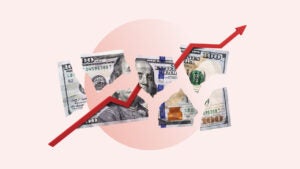Almost half of Americans are in debt. Is doom spending to blame?

If you’ve ever found yourself browsing your favorite retailer online or impulsively buying a flight as a stress response, you may have been engaging in what’s known as doom spending.
Doom spending involves spending more than you can afford — even accruing debt — as a coping mechanism. It might give you a sense of control when other things feel unmanageable. Or it can offer a temporary endorphin boost to counter feelings of stress or anxiety.
Learn more about why some Americans are doom spending and how to not fall victim to the habit.
Key term
- Doom spending
- Overspending as a way to cope with stress
Key insights on doom spending
- Some Americans are coping with financial stress by doom spending. Similar to doom scrolling, doom spending involves mindlessly partaking in an unhealthy habit to cope with stress or anxiety.
- Nearly half of Americans with credit cards are in debt. Forty-four percent carry a balance from month to month.
- Americans feel overwhelmed by financial stress. Credit denials, lack of savings and an inability to afford a house are just a few reasons why.
Americans are racking up credit card debt for doom spending
When it comes to doom spending in America, the symptoms are all there — even if data on doom spending specifically is limited.
Nearly half (44 percent) of credit cardholders are carrying debt from month to month. And in a recent Bankrate survey on discretionary spending, more than 1 in 3 (38 percent) Americans said they would go into debt for fun this year.
In addition to swiping their credit cards, more than 1 in 3 (39 percent) of Americans say they’ve used at least one buy now, pay later (BNPL) service. These services allow you to pay for a large purchase in a series of installments while keeping more cash in your pocket, but they’re still a form of debt.
What’s the harm in doom spending?
Like other unhealthy habits, the effects of doom spending can last a long time. Credit card debt is one of the most expensive forms of debt, and interest rates are high. Today’s purchases cost more later if you aren’t able to pay off your balance.
Plus, spending more than you can afford might mean your savings take a hit. And if times get hard — you lose a job, need to repair your car or have to pay a big medical bill, for example — it’s good to have money already set aside. Savings also affect how and when you’re able to pay for life events like a wedding, children or retirement.
So why are Americans spending more than they can afford? Sure, inflation and cost of living are high. But it’s worth taking a closer look at the reasons behind these purchases.
“Building financial wealth is harder for me than it was for my parents:” Why Americans are stressed about money
To put it simply, money is stressing Americans out.
Nearly half (47 percent) of Americans say money has a negative impact on their mental health, according to Bankrate’s Money and Mental Health Survey. That’s more than the impact of their personal health, current events, friends’ and family members’ health, relationships, work, personal appearance, chores and even parenting.
Here are a few more money woes Americans are currently facing:
- Overwhelmed by debt: More than 1 in 5 (22 percent) Americans who carry a balance month-to-month say they’re overwhelmed by their credit card debt.
- Can’t get credit: Half (50 percent) of Americans who’ve applied for a loan or financial product since the Federal Reserve started raising its key benchmark rate in March 2022 have been denied.
- Not saving enough: Two in 3 (67 percent) Americans with savings are earning an annual percentage yield (APY) of less than 4 percent, and 1 in 3 (33 percent) Americans reported they don’t have any short-term savings.
- Can’t afford to buy a house: More than half of aspiring homeowners say the current cost of living is too high or their income is not high enough for them to afford a down payment (51 percent) and closing costs for a home (54 percent). Further, 20 percent of aspiring homeowners don’t think they’ll ever be able to save enough to buy a home.
- Can’t build financial wealth: Nearly 2 in 5 (38 percent) Gen Z and millennials (those ages 18 through 43) believe they have a harder time building financial wealth than their parents did at their age due to the economy.
How to avoid the stress-induced urge to spend
There’s no denying that Americans face tough economic circumstances, and it’s natural to feel some anxiety about it. But doom spending will only dig you into a deeper financial hole. Instead, consider these ways to spend within your means while coping with stress productively.
Avoid an all-or-nothing approach
Following advice like the 50/30/20 budget rule can feel unattainable when money is tight. But rather than giving up on your budget, set more reasonable goals for yourself that fit your personal finances.
For instance, even if you’re not able to save the recommended 20 percent of your income, you can save five to 10 percent (or whatever you can afford) in a high-yield savings account, rather than spending it all.
Spend money in moderation
You don’t necessarily have to feel guilty about spending while in debt. Some expenses are essential, and some add value to your life — like time spent with loved ones, even if it costs you a coffee or a flight.
The key is to have a plan for how much you’ll spend each month versus how much you’ll save or use to pay off debt. You can enjoy simple pleasures more when you’ve budgeted for them. Reasonable spending may even help you avoid binge spending.
Make a debt repayment plan
If overspending is like digging yourself into a hole, then credit card debt will take the shovel and dig deeper for you. That’s because credit card interest compounds, which means you pay interest on your interest each day the balance goes unpaid.
Balance transfer credit cards and 0 percent APR cards with generous introductory offers may help reduce the interest you accrue as you pay off your debt. But even if you don’t qualify for these offerings, prioritize establishing a credit card debt repayment plan — it’ll help you gain control over your finances, as well as save you money in the long run.
Why we ask for feedback Your feedback helps us improve our content and services. It takes less than a minute to complete.
Your responses are anonymous and will only be used for improving our website.






